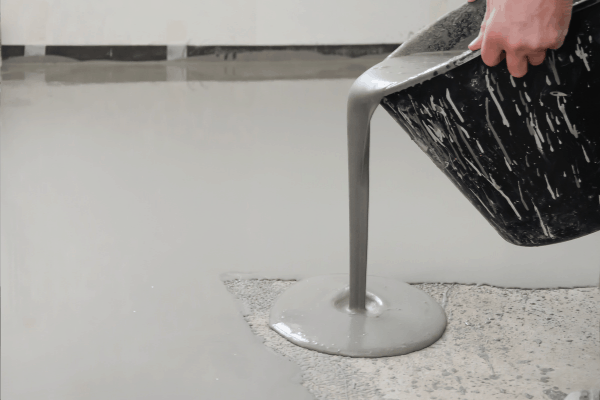If you’re building a home studio, you need to concentrate on the floor. The right floor can ensure that you don’t need to deal with issues like echoes and reflected sound. One of the most common flooring materials today is epoxy, and you may wonder if epoxy floors are good for your home recording studio.
Epoxy floors are suitable for home studios as long as the epoxy is laid over a concrete surface. Recording studio floors should be hard, which is what a concrete floor offers. The epoxy can then be added to make the floor more attractive and help it match up to the design of the rest of the studio.
This article will look at why a concrete and epoxy floor is a good option for home recording studios and examine alternative flooring options that you can consider.

The Reasons Concrete and Epoxies Floors Are Good for Recording Studios
When choosing a flooring material for your home recording studio, it should be hard, dense, and reflective. This helps the music you are making sound “good” or natural.
Ideally, your walls and ceilings should be soft and handle the sound absorption part of the equation. If you make your floors equally soft and sound absorbent, you risk the music sounding flat. This “dead” sound happens because a fully absorbent room has no sound reverberation.
There are few flooring options as hard, dense and smooth as well-laid concrete. Additionally, concrete is one of the most cost-effective recording studio flooring options available.
While concrete is great for a recording studio, it doesn’t always look welcoming, warm, or beautiful. That’s why most musicians shy away from this material and start looking for more aesthetic flooring options, even if it means compromising on the final sound.
This is where epoxy floors come in.
Epoxy floors are available in a range of colors and patterns and serve as a great way to make your concrete floors look more attractive. Like concrete, epoxy is also relatively affordable.
Furthermore, epoxy is also highly durable and holds up well to heavy use. This is an essential trait in a recording studio, as you will likely be moving heavy recording equipment around the place.
Another advantage of this flooring option is installation and maintenance. Epoxy can be applied fast, so your floors will be ready quickly, allowing you to start making music as soon as possible. Also, unlike many other options, cleaning epoxy floors is a quick, easy process, so you won’t have to spend much time taking care of them.
The combination of concrete and epoxy means you don’t have to break the bank on your studio floors. Money is often tight when designing home studios, which usually have lower budgets than professional studios.
Concrete and epoxy add a depth to the flooring that bare concrete doesn’t offer. At the same time, they don’t affect the advantages that make concrete such a good option for recording studio floors.
Other Flooring Options
While concrete and epoxy floors are undoubtedly an excellent option for recording studio floors, they aren’t the only option available for you to choose from.
Given the need for a hard surface, it should first be noted that carpet is never a good idea for a recording studio. There are several reasons for this, including:
- Studios tend to be high-traffic areas, and carpet doesn’t hold up well to wear and tear. It can also hold a lot of dust, dirt, and debris, and cleaning or replacing carpeted floors can be an expensive proposition.
- Carpet is a poor acoustic material. It is a thin, absorptive material which means that while it reflects lower frequencies, it absorbs high and mid-range sounds. This creates a studio with a strange, booming quality and is also very bassy
, making it challenging to record and produce music effectively.
If carpet is the only flooring option for your recording studio, it is possible to design the space in a way that makes the carpet work. However, this can be both challenging and expensive, as you’ll likely need specialized professional help to make a carpeted studio sound good.
As far as you can, carpet is a flooring material that should be avoided for home studios. Flooring materials that you should consider instead include:
Hardwood Flooring
Hardwood flooring is perhaps the most popular option when it comes to recording studios. Not only is it aesthetically pleasing, but it is also one of the best acoustic materials available.
In fact, while its sound reflection properties are similar to concrete, reflected sounds tend to be more pleasing and organic with hardwood floors.
However, the challenge with this flooring option is the cost. Genuine hardwood is one of the most expensive options available and can easily cost over $20 per square foot. Thus, while hardwood is acoustically advantageous, it’s essential to make sure it fits your budget before going with this option.
Laminate Flooring
For people who want the look of hardwood without the accompanying cost, laminate flooring can seem like a good idea. It is more effective and more durable, which is great when you’re moving heavy equipment around the studio.
Plus, both installation and maintenance are relatively straightforward.
However, laminate is usually thinner than hardwood. This means that the acoustics may not be of the same quality that the genuine material offers.
That said, it is possible to work around this issue – one simple solution is layering plywood with a soundproofing compound between the layers, which improves the studio’s acoustics.
Once you’re satisfied with the sound, you can then finish with a layer of laminate over the plywood. This allows you to have the best of both worlds – the aesthetics and acoustics of hardwood at the price of laminate.
Vinyl Flooring
Beyond laminate, hardwood, and concrete, vinyl is another popular option for recording studio floors. Like laminate and concrete, it is another budget-friendly option for you to consider and is also effective as a sound and temperature insulator.
However, the true advantage of this material lies in its acoustic qualities. Vinyl reflects sound brilliantly, and many people feel that its reflective abilities are equal to those offered by hardwood. This combination makes it an excellent option for recording studio floors, and it is often preferred over laminate.
Additionally, like epoxy, vinyl is available in a range of patterns and colors, making it easy for you to personalize your floors to match the rest of your studio.
However, vinyl can fade over time, especially if exposed to sunlight. Additionally, as it is a soft material, it can easily be damaged by sharp objects and heavy equipment, which can be an issue when you shift your recording equipment around the studio. But since replacement is also cost-effective, this isn’t necessarily a major disadvantage.
Other flooring materials you can consider including cork, linoleum, and ceramic tile. However, while they are undoubtedly preferable to materials like carpet, if possible, it’s always best to opt for concrete or one of the materials mentioned above.
Final Thoughts
As a hard, dense, and reflective material, concrete is one of the best choices for a recording studio floor. It is over concrete that you will lay your epoxy floor, giving your floors warmth and depth while keeping the acoustic benefits of concrete.
Other flooring options available to choose from include hardwood, vinyl, and laminate. However, it’s essential to choose a hard flooring option rather than a softer material like carpet. These materials are often poor acoustically and can also be of limited durability, which is an issue in a high traffic area like a recording studio.
Sources
- Home Recordio: What Is The Best Flooring for Recording Studio?
- Allure of Sound: Hard Flooring is Best for Your Music Studio
- John Sayers Productions: Why hardwood floors?
- Acoustic Geometry: Acoustic Flooring for Your Recording Studio
- Range of Sounds: Best Flooring for Recording Studios
Recent Posts
QuickTime is a vital app for many Mac users, and if you’ve recently bought a new microphone, you might wonder how to use it optimally. QuickTime cannot record audio content if it doesn’t have...
Every microphone leaves a unique signature on the quality of its output. If you’re a podcaster trying to melt your way into your audience’s hearts, a muddy, distorted recording won’t cut it....
